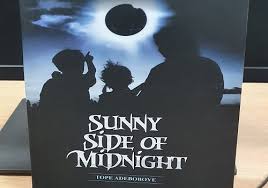By Olukorede Yishau
When Jesus Christ lived as a man over 2021 years ago, the art of photography did not exist. The first camera was not invented until many centuries after our Lord’s ‘exit’. But, if you go to our churches, you will see pictures of Jesus adorning the walls. What some people do not know is that the common image used to depict Christ is that of Robert Powell, a British actor and comedian, who played the role of Jesus in the 1977 movie ‘Jesus of Nazareth’. Powell, now 76 and looking nothing like the pictures on the walls in our churches and homes, and even some offices, has cried out about this anomaly; however, daily, more prints of his image are made and sold as Jesus Christ to decorate the walls of churches and homes of Christians, and millions kneel before his image tearfully screaming “you are worthy to be praised”.
You may wonder why I am bringing this up; it is one of the many glaring and subtle remonstrations in Tope Adeboboye’s ‘Sunny Side of Midnight’, an illuminating debut and an important addition to literature by the man who gifted us ‘Songs of My Rebirth’. Adeboboye, who is the ‘brand new’ Saturday Sun Editor, displays impatience with a system that has kept Nigerians down from time immemorial. His tool to deliver punches on our leaders is Adaba James, a brilliant but jobless University graduate who earns small cash at a tutorial centre. His story shows a man who has done almost everything right in the sight of God: He does not womanise, he does not drink, and smoking of any kind, except “smoking gari”, has no place in his life.
So, he expects that at 25 and a clean man, things should go well for him but, instead, he lives from hand to mouth and, when he is praised for coming out the best at an interview, he thinks his best days are beckoning, only for the job to be given to a lady who was abroad when the written and oral tests were done. He is pained seeing the bad people in the society having all the good things of life while those who follow the rules become the dregs of the society.
The protagonist’s travail is peppered with commentaries about a government peopled by selfish souls. His quest for a way out of poverty leads him to an old school mate who, only a few years after graduation, is living large with two cars to cruise about town and enough cash to paint the town red. Ideku helps out but hooliganism soon kills his hope, and he is naked once again at a time trouble decides to make life hell for his helper. What follows is expertly handled by the author and it helps take the story to another level. The suspense from this point gives the feeling the book is just beginning. The role of an Indian hemp smoker plays from this point on is interesting.

Adeboboye brings alive what it takes to live in a land where leaders are dealers ever willing to sell their people for filthy lucre, where the rich and powerful hijack an area in the name of reclamation, where thousands are made to scamper for job vacancies that have been filled even before the call for applications is made, and where the clarion call is: “to your tent, oh Israel.” The author takes Adaba to hell and back and he does this ‘evil’ so well that one begins to look at the bad things happening as cool.
He also examines how a man tries to resolve ethical questions when faced with making difficult decisions in the face of biting, searing poverty. This challenge of joining or not joining the bandwagon is one many have faced and many have failed at.
The setting of the novel, Anija, qualifies as a character because the author devotes ample time to depict this city where poverty and abundance cohabit, where slums and posh neighbourhoods sit facing each other, where government hospitals exist only in name with their doctors and nurses now in private practice, where kleptomaniac leaders compete about whose loot is bigger, where infrastructure is at its lowest ebb, where charlatans pretend to be men of God and fleece the needy, and where there seems to be no light at the end of the tunnel. It is indeed a place that works, in the main, only for the rich and powerful.
The book touches on child labour, spirituality, corruption, favouritism, hooliganism, greed, and the evil men do in the name of our Father in heaven. At its core are the issues of faith and destiny, raising posers: Can bad things repeatedly happen to one person just for the fun of it? Must there be an evil force behind such ordeals? Are there evil people out there whose happiness stems from making others sad through fetish means? Can a man’s life be programmed even before his birth? Is there destiny? Can destiny be changed by prayer and divination? What has faith got to do with our lives?
While the answers to the posers are bound to be subject to all kinds of considerations, Adeboboye’s prowess is, however, easily discernible. This book does not only hum, it sings, and sings well; it has harmony and ticks many boxes of a worthy work of fiction. The harmony syncs so well that it will not be your choice about when to turn the pages, because the chances that you have turned the next page before knowing are high.

The tale is enveloped in elegance and drips with poetry and beauty. Adeboboye recreates the landscapes of Nigeria beautifully and he excites with his so many beautiful expressions thus delivering a rousing novel that is truly remarkable. Even when he creates a non-existent place like Anija, we can see in it Abuja, Lagos, Port Harcourt, Ibadan and many of our cities and towns afflicted by the disease called Acute Leadership Failure.
Adeboboye has rendered in grisly details the story of Nigerians and how they live with decades of failed leadership, nepotism, corruption, favouritism, and much more. It also highlights the evil men of the cloth do all in the name of performing deliverance.
By the time we reach its nerve-wracking ending, the story has turned into something to ruminate over, raising posers about gods and their priests, and even pastors and their methodology. And it seems the author is saying: The ways of God are not known in specifics by anyone born of the sexual union between woman and man.
My final take: Take down that image of Robert Powell on the walls, either in the churches or homes or offices. He is a great actor and superb comedian and not our Lord Jesus Christ. He is neither worthy to be praised nor worshiped.
• Yishau is a columnist and author of ‘In The Name of Our Father’ and ‘Vault of Secrets’.